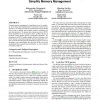86 search results - page 2 / 18 » Automatic memory reclamation for lock-free data structures |
IPPS
2006
IEEE
13 years 11 months ago
2006
IEEE
Achieving high performance for concurrent applications on modern multiprocessors remains challenging. Many programmers avoid locking to improve performance, while others replace l...
JPDC
2007
13 years 5 months ago
2007
Achieving high performance for concurrent applications on modern multiprocessors remains challenging. Many programmers avoid locking to improve performance, while others replace l...
PODC
2011
ACM
12 years 8 months ago
2011
ACM
Dynamic memory management is a significant source of complexity in the design and implementation of practical concurrent data structures. We study how hardware transactional memo...
ECOOP
2003
Springer
13 years 10 months ago
2003
Springer
Despite Java’s automatic reclamation of memory, memory leaks remain an important problem. For example, we frequently encounter memory leaks that cause production servers to crash...
KDD
2010
ACM
13 years 9 months ago
2010
ACM
Memory leaks are caused by software programs that prevent the reclamation of memory that is no longer in use. They can cause significant slowdowns, exhaustion of available storag...

